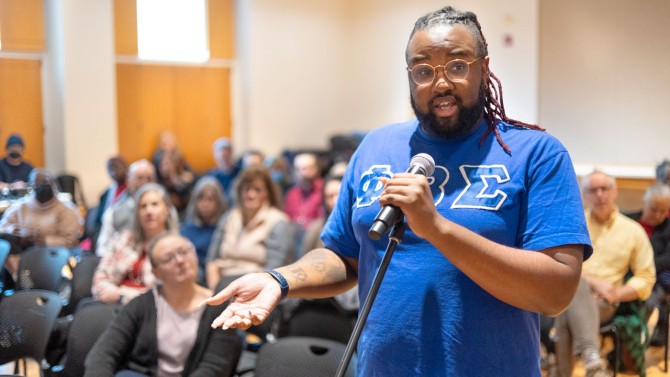
President Martha E. Pollack delivers her annual Address to Staff on Jan. 11.
Pollack thanks staff for advancing Cornell’s mission
By James Dean, Cornell Chronicle
During her annual Address to Staff on Jan. 11, President Martha E. Pollack thanked employees – from Cooperative Extension experts to the professionals supporting Cornell’s libraries, labs and dining halls – for their role in advancing the university’s mission and core values.
“Each one of you is part of moving our values and our mission forward – with the creativity and the solutions, the knowledge and the inquiry, and the global citizens and leaders our society needs to thrive,” Pollack said.
Before her remarks, which were livestreamed from Room G10 of the Biotechnology Building – watch a replay here – Wendy Treat, a program coordinator in the College of Veterinary Medicine and exempt employee representative on the Employee Assembly, presented the assembly’s 2024 Appreciation Award to the David M. Einhorn Center for Community Engagement.
“The projects and research facilitated by the staff at the Einhorn Center for Community Engagement benefit community members as well as the staff, faculty and students of Cornell University as they work together to bring about positive change in the world,” Treat said.
Pollack noted that she was speaking on a special occasion: Ezra Cornell’s 216th birthday, an event once celebrated as Founder’s Day. During its recognition in 1888 – covered by the New York Times – students marched to Cornell’s tomb and the armory to hear a speech titled, “A People’s University.”
Cornell remains that “because of our incredible people,” Pollack said; people who are helping to re-imagine for the 21st century Cornell’s founding vision for “an institution where any person can find instruction in any study.”
Pollack highlighted achievements over the past year in the context of core values the university adopted in 2019 – as a reflection not just of our past and present, she said, “but also of our potential: They describe who we are, and they describe who we want to be.”
The first value, “purposeful discovery,” is embodied in the work of faculty members and students expanding the boundaries of human knowledge, Pollack said. This year, more than 80 graduate students earned National Science Foundation research fellowships – the largest group of new fellows Cornell has fielded in one year – reflecting their excellence and that of the staff supporting them, Pollack said. She also congratulated the nearly 30 staff members who earned degrees from Cornell and other institutions, leveraging employee education benefits.
The second core value, “free and open inquiry and expression,” has been explored and celebrated during Cornell’s universitywide theme year, “The Indispensable Condition: Freedom of Expression at Cornell,” including through panels on First Amendment law; exhibits and performances; and the new John W. Nixon ’53 Distinguished Policy Fellows program, part of the Cornell Brooks School of Public Policy’s Learning and Leading through Difference Initiative.
Pollack said Cornell’s “… any person … any study” motto reflects a foundational commitment to the core value of being “a community of belonging.” Over the past three years, she said, the number of students receiving financial aid has increased by nearly 850, and this fall, most students from families with annual incomes up to $75,000 will pay no tuition and receive no-loan financial aid packages. Cornell is the first Ivy League school to establish an endowed position supporting first-generation and low-income students, held by Dannemart Pierre, the Peggy J. Koenig ’78 Associate Dean of Students for Student Empowerment in the Division of Student and Campus Life.
“Exploration across boundaries” is fundamental to addressing challenges that don’t fall neatly into one field, Pollack said. Recent examples include the multicollege Paul Rubacha Department of Real Estate, a collaboration between the College of Architecture, Art and Planning and the Cornell SC Johnson College of Business; the Master of Public Health program’s One Health approach, recognizing the interconnections between people, animals, plants and the planet; the multicollege Department of Design Tech, spanning the Ithaca and Cornell Tech campuses; and the first Intercampus Vaccine Symposium, hosted by the College of Veterinary Medicine.
“Many of you have been involved in supporting these tremendously important programs, and I want to sincerely thank you for that,” Pollack said.
Pollack highlighted the work of the Einhorn Center and Cornell Cooperative Extension – which has a presence in every New York state county – as central to the fifth core value, “changing lives through public engagement.” For example, an Einhorn Center partnership with Cornell Law School provides pro bono legal assistance to formerly incarcerated individuals reentering the local community.
Finally, Pollack reviewed sustainability initiatives advancing the core value of “respect for the natural environment,” including the goal to achieve carbon neutrality on the Ithaca campus by 2035. They range from innovative research supported by the Cornell Atkinson Center for Sustainability and The 2030 Project, to a program repurposing departing students’ furnishings, to dining operations’ composting of food waste and use of smart refrigeration technology and centralized oil recovery and refill systems.
“My thanks to all of you,” Pollack said in closing, “for everything you do to make Cornell a place for ‘any person … in any study,’ where our imagination is matched by our innovation, and our ethos by our excellence.”
Media Contact
Get Cornell news delivered right to your inbox.
Subscribe

